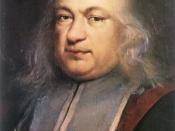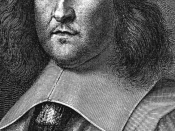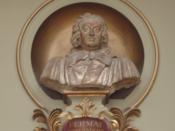Pierre de Fermat was born on August 17, 1601 in Beaumont-de-Lomagne France to a Catholic family as one of four children. Fermat's father was a wealthy leather merchant. Fermat was educated at the Grandselve Franciscan Monestary and later attended the University of Toulouse. After finishing college in 1631, Fermat became a lawyer and government official in Toulouse. At this time, Pierre Fermat changed his name to Pierre de Fermat.
During his life, he is often called "Prince of Amateurs", because he was a French lawyer who pursued mathematics during his free time. Fermat is known as the founder of modern number theory and probability theory. He also establishes coordinate geometry (using algebra as a tool for solving geometric problems and vice versa) and invented methods for determining maxima and minima that were later of use to Newton in applying the calculus. Some of his most striking works were found after his death on loose sheets of paper and are unaccompanied by any proof since he never published them.
His son published much of his work in 1679 under the title 'Opera mathematica' (Mathematical Works).
Two of his works are the Fermat's Last Theorem, which state that xn+yn = zn has no integer solutions for n>2, and the Fermat's Little Theorem, which state that if p is a prime and a is relatively prime to p, then ap-1 - 1 is divisible by p. Leonhard Euler proved the Fermat's Little Theorem, but the other one was not proven until 1993 by Andrew Wiles. During his life, he has accomplished many mathematical theorems. Many of Fermat's theorems were incomplete, but the main point was stated so it was not hard for others like Euler to complete his work. He was reported dead in 1653 due to a plague, but he actually died...


